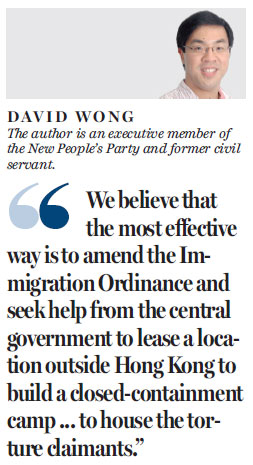Illegal immigration to Hong Kong must be stopped as soon as possible
Updated: 2016-04-19 07:36
By David Wong(HK Edition)
|
|||||||||
There have been numerous reports about criminal syndicates using illegal immigrants to commit organized crimes in Hong Kong; many of those illegal immigrants have presented themselves as "torture claimants". The community is increasingly concerned these claimants have contributed to the rise in the city's crime rate and the deterioration of public safety. According to the Immigration Department, there were 232 cases of unlawful employment of aliens in 2015, up 40 percent from 2014; most of those who were illegally employed are torture claimants. Police records also show that there were a 67 percent annual increase in theft, wounding, serious assault and serious drug offenses committed by illegal immigrants, most of them also torture claimants.
As at the end of 2015, there were still 10,922 cases of torture claims waiting to be assessed in Hong Kong. The average monthly new cases increased from 102 to 440 in the past few years. The number of non-Chinese illegal immigrants arrested rose from 68 to 318 on average per month. It should be noted that around 70 percent of torture claimants declared their claims only when intercepted or arrested by the authorities. Overall, they had already stayed on average 11 to 19 months before they submitted their claims. About 80 percent of the claimants came from Vietnam, India, Pakistan, Bangladesh and Indonesia.

The Court of First Instance of the High Court ruled in 2009 that the government had to implement a series of measures, including providing free legal support to torture claimants. As such, the Immigration Department has modified its administrative procedures to provide duty lawyers to these claimants as well as appointed adjudicators to independently assess the cases. It is a lengthy process with an average processing time of over two years. Moreover, during the application process, some claimants use bizarre tactics to delay the proceedings. For example, some asked for a postponement on the grounds that they have additional supporting documents to submit, but did not do so in the end. Some who had been communicating with the authorities in English would suddenly demand to have the adjudication conducted in some rarely used dialect. Some required medical examinations but did not show up at the appointment, or challenged the professional qualification of Hospital Authority's medical staff during the inspection as well as the security of its medical database.
The government estimated that the total expenditure for processing these claims and providing support to the claimants amounted to HK$644 million in the year 2015-16. So far, the Immigration Department has completed the assessment of over 3,000 claims, of which only less than 30 were established.
Many illegal immigrants who have delayed their deportation by raising torture claims have entered the local community. They often end up as unlawful employees or even engage in criminal activities that severely affect Hong Kong's public safety. Recent media reports have also brought public attention to the South Asian immigrant community, with some legal ethnic minority immigrants being mistaken as "fake refugees" and being harassed. If the situation does not improve soon, there may be increasing discrimination and even hostility against ethnic minorities. That would surely impinge on social harmony and trigger new conflicts. Certainly the government has an obligation under international conventions to protect human rights. On the other hand, it must also defend the life and property of local residents as well as promote social and racial harmony.
China has signed the Convention against Torture and other Cruel, Inhuman and Degrading Treatment or Punishment. According to Article 3 of the convention, "no State Party shall expel, return or extradite a person to another State where there are substantial grounds for believing that he would be in danger of being subjected to torture". There were suggestions from the community that Hong Kong should simply withdraw from the Convention against Torture. However, that would require the mainland to do so as well, which would undoubtedly have complicated repercussions. Furthermore, Hong Kong has also signed the International Covenant on Civil and Political Rights and has implemented the Bill of Rights Ordinance. Both of these have clauses on the deportation of torture claimants as well. As such, withdrawing from the convention is not a good remedy to this problem.
We believe that the most effective way is to amend the Immigration Ordinance and seek help from the central government to lease a location outside Hong Kong to build a closed-containment camp, similar to those for the Vietnamese boat people in the 1980s and 1990s, to house the torture claimants.
Leasing an off-territory location would undoubtedly speed up the planning and construction process. Most importantly, once it was announced that torture claimants would have to stay within containment camps, the news itself would have a strong deterrence and greatly reduce the incentive for fake refugees to come to Hong Kong. Some may even choose to leave Hong Kong immediately. With fewer cases to be assessed, it would also speed up the processing time for real torture claimants. This proposal could definitely kill several birds with one stone.
(HK Edition 04/19/2016 page10)